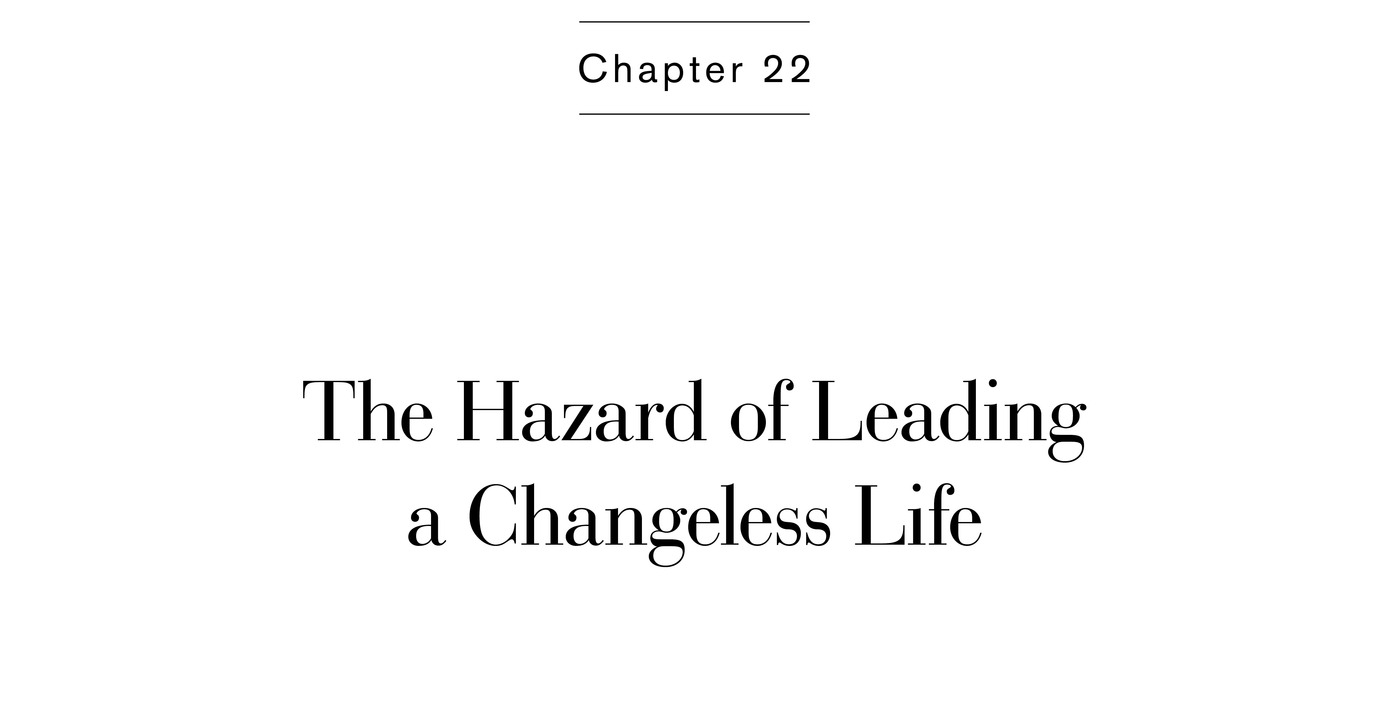

Imagine living a life in which nothing changed.
I’m not talking about working at the same company your entire adult life, or staying married to the same person for fifty years, or never leaving the community you were born in. Those are choices to be honored, not regretted or derided. At the far side of a long and happy existence, they reflect a sturdy permanence worth celebrating.
Nor am I talking about going through life and never changing the food we order in a restaurant, the style of clothes we wear, the music and TV shows and books we enjoy, even the social and political views we hold. Going through life and never changing our tastes, opinions, and everyday preferences, even if we’re the most obdurate person in the world, is unimaginable—because our environment won’t allow it. The world around us changes and we change with it, if only because it’s easier to go with the flow.
Even among the steadiest of people—the kind living in the same house with the same partner and working at the same job their entire adult life—it’s hard to imagine a completely changeless existence.
And yet there’s one aspect of our lives where we wear changelessness as a badge of honor. I’m talking about our interpersonal behavior and our resistance to changing how we treat other people.
The sister we haven’t seen or spoken to in years because of some long-forgotten grievance.
The old friend we still tease with a cruel childhood nickname that he’s long outgrown.
The neighbor we’ve seen for years and, out of shyness or inertia or indifference, have never introduced ourselves to.
The customers we resent for the demands they place on us.
The anger we display that is so inevitable our family members take bets on when we will erupt.
The scolding response when a child disappoints us.
Most of us would mock a restaurant that never changed its menu. But we are not so reproachful or mocking with ourselves. We take a foolish pride in prolonging some behaviors as long as possible, with no regard for who is harmed. Only when it’s too late to undo the damage and we have reached some objective distance do we rethink our behavior, perhaps regret it. Why did we go all those years without talking to our sister? Why were we cruel to our best friend? What relationship did we miss by not introducing ourselves to a neighbor? Why not thank a customer for placing the order? What would it cost us to offer a soothing word to our upset child?
When we prolong negative behavior—both the kind that hurts the people we love or the kind that hurts us in some way—we are leading a changeless life in the most hazardous manner. We are willfully choosing to be miserable and making others miserable, too. The time we are miserable is time we can never get back. Even more painful, it was all our doing. It was our choice.
In this book’s opening pages, I promised that if I did my job properly, you the reader would have a little less regret in your life.
Now it’s your turn. I’m not asking much. As you close this book, think about one change, one triggering gesture, that you won’t regret later on. That’s the only criterion: you won’t feel sorry you did it. Maybe it’s calling your mother to tell her you love her. Or thanking a customer for his loyalty. Or saying nothing instead of something cynical in a meeting. It could be anything, as long as it represents a departure, however modest, from what you’ve always done and would continue doing forever.
Then do it.
It will be good for your friends. It will be good for your company. It will be good for your customers. It will be good for your family.
And even better for you. So much better, you will want to do it again.